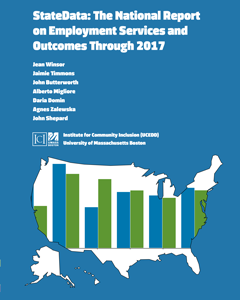Since 1988, Access to Integrated Employment (AIE) has described trends in day and employment services and outcomes for individuals with intellectual and developmental disabilities (IDD). This research project explores the factors that contribute to employment outcomes at multiple levels: individual achievement, employment support practices, service provider engagement, and state policy reform. AIE is funded by the Administration on Disabilities, Administration for Community Living.
AIE’s efforts have impacted employment supports, informed complementary research and evaluation projects, led to a model of employment systems change, supported individuals with IDD to tell their employment story, and facilitated the use of data as a performance management strategy. Explore Access to Integrated Employment projects below!

Projects Supported by Access to Integrated Employment
StateData.info
StateData.info is a compilation of federal, state, and self-collected data sets on employment of people with IDD. StateData.info allows users to generate customized charts, conduct their own analyses, and download free publications that analyze critical issues and important findings in the area of disability and employment. Go to StateData.info to learn more!
National Survey of State IDD Agencies' Day and Employment Services
This annual survey describes the nature of day and employment services for individuals with IDD. The data collected is summarized annually in the National Report (below) and available on StateData.info. Read summaries of previously collected data.
 StateData: The National Report on Employment Services and Outcomes Through 2017
StateData: The National Report on Employment Services and Outcomes Through 2017
Access the latest information about employment and economic self-sufficiency for people with intellectual and developmental disabilities. Both national and state-level statistics are included.
Download the PDF here*Download the report narrative, no tables (Accessible PDF)
State Agency Promising Practices
This promising practices database highlights innovative policies and strategies that state IDD agencies are using to increase integrated employment opportunities. Go here to learn more: State Agency Promising Practices
Service Provider Promising Practices
The national landscape is changing, with an increasing emphasis on community employment opportunities for individuals with IDD. This activity focuses on service providers engaged in practices that reflect individual integrated employment as a priority outcome. Go here to learn more: Service Provider Promising Practices
Think Work Stories
Think Work Stories shares stories of people with IDD who are thriving in competitive jobs in their communities. The stories highlight these individuals’ achievements, and also showcase how state agency staff have helped them get hired and maintain fulfilling careers. Go here to learn more: Think Work Stories
